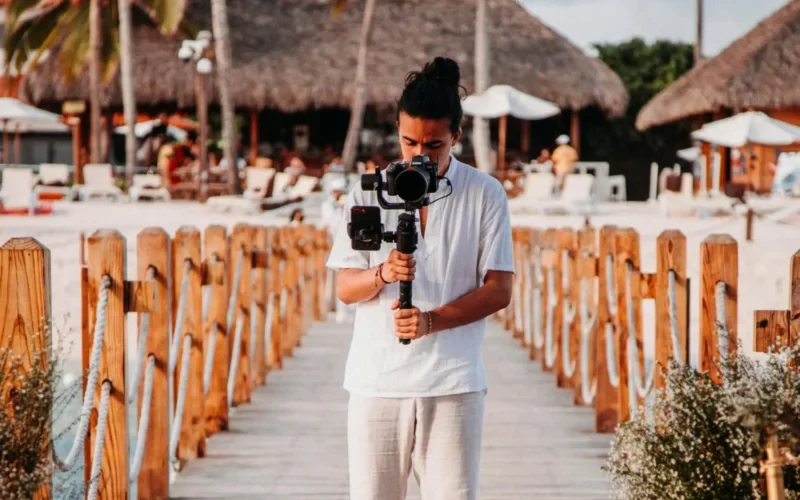Understanding the Wedding Videography Process
The wedding videography process is an intricate journey that begins well before the actual wedding day. Initially, couples typically engage in a consultation with their videographer to discuss their vision, preferences, and the unique elements they wish to capture. This pre-wedding meeting is crucial and allows the videographer to understand the couple’s story, style, and the nuances that should be highlighted during filming. It is also an opportune time to review packages, types of videos offered, and any specific requests.
On the wedding day, the videographer captures the event using various techniques and equipment, often including multiple cameras to ensure every angle is covered. The filming encompasses a range of moments—from the intimate preparations prior to the ceremony to the lively celebrations at the reception. This is where skilled videographers excel, seamlessly blending into the festivities while also capturing candid moments that speak to the couple’s experience.
Couples can expect several types of wedding videos as part of their package. The highlights reel, typically lasting a few minutes, provides an engaging summary of the day, set to music that resonates with the couple. A full-length video offers a comprehensive view, often spanning the entire event with detailed storytelling. Additionally, teaser trailers are increasingly popular, offering a brief glimpse into the wedding day shortly after the event, igniting excitement among family and friends who wish to share in the experience.
Overall, understanding this wedding videography process is crucial for couples. It prepares them for what to expect in terms of delivery timelines and the quality of their final videos, thus ensuring their memories are beautifully preserved for years to come.
Factors Influencing Video Editing Time
Editing a wedding video is a process that can vary significantly in duration, influenced by multiple factors. One primary consideration is the videographer’s workload at the time of the wedding. A professional videographer may be juggling several projects simultaneously, which can extend the editing timeline. If they are in high demand or have a schedule packed with various events, this could delay the completion of your wedding video.
Another crucial factor is the number of videos the videographer is currently managing. When they are working on multiple weddings at once, your video may be queued for editing, as they will prioritize tasks based on client timelines and contract obligations. The more weddings they have to edit, the longer it might take for your project to receive the attention it needs for quality results.
The complexity of the footage also plays a pivotal role in determining the editing timeline. If the wedding involved unique elements, such as multiple locations, extended aerial shots, or diverse audio sources, the editing process can become more intricate and time-consuming. Additionally, if the couple requests unique edits or specific styles, this customization will further impact the total time required to deliver the final video.
The overall length of the wedding day contributes to the duration of the editing process as well. More extended events generally yield more footage to sift through, analyze, and edit. Lastly, special requests from the couple—such as incorporating specific music tracks or creating highlight reels—can add layers of complexity, thus extending the editing timeline. Understanding these factors can help couples set realistic expectations regarding when they can anticipate receiving their wedding video.
Typical Wedding Video Delivery Timelines
Understanding the timeline for receiving your wedding video is crucial for couples eager to relive their special day. Generally, the delivery time for wedding videos can vary significantly based on the type of editing service chosen and the videographer’s workload. In the wedding videography industry, the timelines are typically classified into three categories: quick edits, standard edits, and comprehensive edits.
Quick edits, often referred to as same-day edits, are designed for couples who want to share highlights of their event with guests shortly after the ceremony. These videos may be ready in as little as 24 to 48 hours. However, this type usually features a condensed version of the wedding, focusing on key moments rather than detailed storytelling.
Standard edits are more common among wedding videographers and typically involve a more balanced approach to storytelling. Couples can expect their standard wedding video within four to six weeks following the event. This timeline allows videographers to carefully curate and edit footage, ensuring that the final product resonates emotionally with the couple. Standard edits usually include key moments, such as vows, speeches, and significant dances, providing a comprehensive overview of the day.
Comprehensive edits take the timeline a step further and may require anywhere from six to twelve weeks for completion. These edits include in-depth footage, multiple camera angles, and additional features like interviews and behind-the-scenes clips. This delivery timeframe is generally favored by couples who desire a detailed representation of their wedding day, delving into the nuances that make their celebration unique.
Ultimately, communication with your videographer is vital. Discussing timelines and expectations ahead of time will help reduce any uncertainty as you eagerly await your cherished wedding video.
The Importance of Communication with Your Videographer
Effective communication with your wedding videographer is paramount to achieving a successful outcome that meets your expectations. From the initial consultation to the final delivery of your wedding video, maintaining open dialogue can significantly impact the quality and timeliness of the finished product. It begins with discussing timelines before the wedding day. Understanding when your videographer expects to capture certain moments is crucial; this allows you to feel confident that all significant events are included in the final edit.
Furthermore, regular check-ins during the editing process are essential. After your wedding, it’s common for couples to become anxious about the progress of their video. Establishing clear timelines for when you can expect updates can alleviate such concerns and keep you informed. A good videographer will appreciate your desire for transparency, allowing for a more harmonious working relationship. During these check-ins, you can discuss any particular moments or footage you want to ensure are highlighted, enabling the videographer to better align with your vision.
Additionally, clarifying expectations from the very beginning cannot be overstated. Couples should articulate their preferences regarding style, tone, and any specific scenes they wish to emphasize in the wedding video. This includes discussing any other details, such as music selections or edits. By laying out these expectations beforehand, misunderstandings can be minimized, and adjustments can be made as necessary throughout the editing phase.
In conclusion, a strong line of communication with your wedding videographer facilitates a smoother experience and ultimately results in a wedding video that resonates with you and your loved ones. By taking the time to engage in comprehensive discussions, you set the groundwork for a successful collaboration that culminates in a cherished keepsake of your special day.
What to Do While You Wait for Your Video
Waiting for your wedding video can often feel like an eternity, especially after the excitement of your special day. However, this interval offers a wonderful opportunity to engage with your loved ones and further enhance your wedding experience. One way to keep the anticipation alive is by sharing sneak peeks from the wedding itself on social media. Many videographers provide short clips or teasers that can be posted to platforms like Instagram, Facebook, or TikTok. Sharing these moments not only keeps your friends and family connected but also builds excitement for the full video to come.
Another productive approach during this waiting period is to create a shared online photo album where guests can upload their pictures. This collaborative effort allows everyone to relive the memories and share their unique perspectives from the day. Popular platforms such as Google Photos or Dropbox make it easy to collect images, and it encourages genuine interactions among attendees as they reminisce about the wonderful moments shared together.
Furthermore, planning a screening party can be a great way to commemorate the occasion once your wedding video is finally ready. Invite your closest friends and family over for a cozy evening filled with nostalgia, laughter, and tears of joy. This event could include light refreshments, a comfortable setting, and an anticipation-filled countdown to the premiere of your wedding video, allowing you to enjoy the film in the company of those who witnessed the celebration first-hand.
Overall, while the wait for your wedding video may be challenging, there are numerous enjoyable activities to engage in that can enrich the experience, keep the excitement alive, and create lasting memories with your loved ones.
Understanding Your Videographer’s Contract
Embarking on the journey of wedding planning involves numerous decisions, and selecting a videographer is among the most significant. Understanding your videographer’s contract is crucial for ensuring a smooth and satisfactory experience. The contract serves as a legal agreement outlining the services the videographer will provide, including specific clauses related to delivery times, revision policies, and guarantees.
One of the primary aspects to focus on is the delivery time clause. This section of the contract should clearly specify when you can expect to receive your wedding video. Generally, videographers may take anywhere from a few weeks to several months for final delivery, influenced by factors such as editing time and the current workload. Having a clear timeframe mentioned in the contract helps set realistic expectations and minimizes potential frustrations.
Moreover, it is essential to consider the revision policies mentioned in the contract. These policies outline the process for requesting changes to the video after the initial version is delivered. Some videographers may allow for a certain number of revisions within their service package, while others may charge additional fees for further modifications. Familiarizing yourself with these terms helps ensure that you have the opportunity to fine-tune your wedding video to your satisfaction, ensuring that it meets your vision.
Additionally, be on the lookout for any guarantees offered by the videographer. Such guarantees may provide reassurance regarding the quality of the service and the final product. Understanding these clauses is vital as they could offer protections against unforeseen circumstances that may affect the delivery or quality of your wedding video. By carefully reviewing and understanding your videographer’s contract, you empower yourself with knowledge and peace of mind, ultimately enhancing your wedding experience.
Common Questions About Wedding Video Deliveries
When couples invest in a wedding video, anticipation builds as they await the final product. However, delays are not uncommon in this process. A standard wedding video delivery can take anywhere from a few weeks to several months, depending on various factors such as the videographer’s workload, the complexity of editing, and the raw footage length. It is crucial for couples to understand that each wedding video is unique, and timelines may fluctuate. To manage delays effectively, maintain open communication with your videographer. Regular check-ins can help clarify the status of your wedding video and provide peace of mind.
If you find yourself unhappy with the delivery timeframe provided by your videographer, it is essential to approach the situation diplomatically. First, review any contractual agreements concerning delivery times; this ensures that you are informed of what was initially agreed upon. Next, engage in a constructive dialogue with your videographer. Express your concerns and inquire if there are any issues that may have impacted the timeframe. Clear communication may result in a satisfactory resolution, whether that involves a revised timeline or a partial refund.
Managing expectations is another critical aspect of the wedding video delivery process. Couples should remember that high-quality wedding videos require meticulous editing and post-production work. Define your priorities before the big day; consider what elements you deem essential for your wedding video. Additionally, understanding the creative process can foster patience during the wait. Many videographers share behind-the-scenes content on social media, allowing couples to see a glimpse of their work and progress, which can help bridge the gap while waiting for the final product.
Real-Life Experiences: Couples Share Their Wait Times
The wait for a wedding video can be a time filled with anticipation and excitement, but it is often accompanied by anxiety and uncertainty. Many couples have shared their experiences, highlighting the range of timelines they encountered when expecting their cherished memories to be delivered. For some, the process was seamless, while others faced delays that tested their patience.
One couple, Sarah and Tom, noted that their videographer provided a specific timeline of six months for their wedding video. “At first, we were excited about the timeline,” Sarah recalled. “But as the months went by, we couldn’t help but feel anxious. We were eager to relive our special day and share it with family and friends.” Despite the wait, Sarah and Tom received their video just a week before their six-month anniversary, and they described it as “worth every moment of anticipation.” Their positive outcome underscores the importance of clear communication between couples and their wedding vendors regarding timelines.
In contrast, Jessica and Michael faced a much longer wait. They received their wedding video nearly a year after their wedding day. “Initially, we were understanding about slight delays, but as the months passed, we started to feel left in the dark,” Jessica reflected. “There were periods where we heard nothing, which made the experience more stressful than it needed to be.” Eventually, they received their video, and while it captured the essence of their day beautifully, the lengthy wait left a mark on their overall experience.
These anecdotes illustrate that the timeline for wedding video delivery can vastly differ from couple to couple. While some enjoy timely services, others may find themselves navigating emotional ups and downs throughout their wait. This emotional journey, coupled with the expectations of preserving memories, significantly shapes each couple’s outlook on their wedding videography experience.
Tips for Choosing the Right Videographer for Timely Delivery
Choosing the right videographer is a crucial step in ensuring that your wedding video is delivered promptly. A significant first step is to conduct thorough research. Look for videographers who have a solid reputation, as evidenced by positive reviews and testimonials from past clients. These reviews often highlight the videographer’s reliability and efficiency in delivering wedding videos. Websites like The Knot or WeddingWire can provide valuable insights into the experiences of previous couples.
In addition to reading reviews, it is essential to directly inquire about the videographer’s past delivery timelines during your initial consultation. Ask specific questions such as, “How long does it typically take to receive the final product?” or “Can you provide examples of your average turnaround time?” An established videographer should be able to provide a clear timeframe based on their workload and previous projects. Moreover, asking for sample work can also offer insights into both the quality of their videos and their adherence to deadlines.
Consider looking for videographers who express a commitment to efficiency alongside quality. Some professionals may emphasize their production processes, utilizing modern technology that can streamline the editing phase. Discussing their workflow can reveal whether they prioritize timely delivery without compromising on the quality of the film. Additionally, it is beneficial to confirm how many films they are working on simultaneously, as high volumes might impact turnaround times.
Ultimately, choosing a videographer who has proven their ability to deliver wedding videos on time is critical. By focusing on these factors during your selection process, you can find a professional who meets your needs, ensuring that your cherished memories are provided promptly for you to relive your special day.







